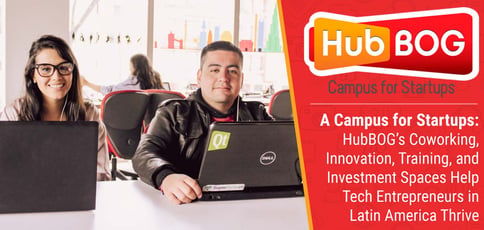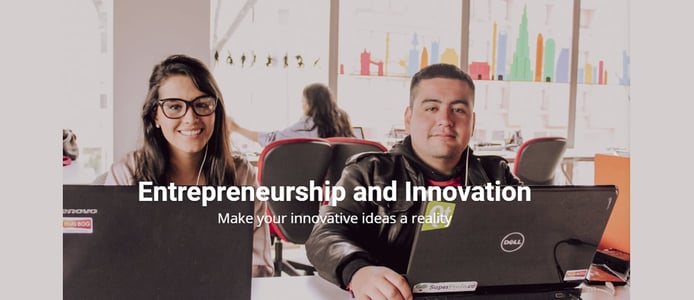
TL; DR: HubBOG, a Latin American campus built for startups in the region, promotes tech-based entrepreneurship by bringing academic, networking, acceleration, and investment opportunities under one roof. Established in 2010, the organization strives to create a collaborative environment conducive to innovation and economic growth. With the lofty goal of accelerating 2,000 startups within the next decade, HubBOG is poised to serve an expanded group of entrepreneurs in Latin America.
We often view Latin America through the lens of its rich culture, historical traditions, and diverse landscapes.
The fact that the region is a hotbed of entrepreneurial activity is reported less frequently. Still, Latin American startups raised $1.6 billion in U.S. dollars in 2019 alone.
In addition, the vast majority (89%) of Latin American youth between the ages of 18 and 25 surveyed in Citi Foundation’s 2015 “Accelerating Pathways” report said they are interested in working for themselves or starting their own business.
Latin America outranked all other would-be entrepreneurs in regions surveyed in the study, including Asia-Pacific and Europe (79%), Africa and the Middle East (74%), and the United States and Canada (64%).

HubBOG helps startups validate their ideas and attract investors while innovating continuously.
The folks at Colombia-based HubBOG know this and are working to promote tech-based entrepreneurship in the region through the first campus for startups in Latin America. The organization, founded in 2010, fosters a collaborative environment that’s conducive to innovation and economic growth.
“We mentor entrepreneurs in Latin America and provide everything from accelerator programs and investment opportunities to educational sessions and coworking spaces,” said Rene Rojas, CEO and Founder of HubBOG.
Since its inception, the team has helped hundreds of accelerated ventures turn ideas into profits. As we move into the next decade, HubBOG intends to bring those services to an expanded group of entrepreneurs, with the lofty goal of accelerating 2,000 startups by 2030.
From BogoTech to HubBOG: Inspiring Latin American Tech Entrepreneurs
HubBOG’s roots go back to 2008, when the company’s Bogotá, Colombia-based leaders launched a Latin American community for tech startups known as BogoTech.
“BogoTech was the pioneer of tech meetups in Latin America for startup entrepreneurs,” Rene said. “The goal was to inspire communities to start new companies and realize the potential of working in startups.”
Today, the meetups are held every two months, where entrepreneurs, developers, designers, investors, and others gather to discuss and showcase new industry ventures. Past events have featured speakers from successful Latin American tech startups, including Rappi, an on-demand delivery service headquartered in Bogotá, and MercadoLibre, an online marketplace based in Buenos Aires.

The company offers everything from practical courses and coworking spaces to investment solutions.
In 2010, HubBOG was born out of BogoTech with the goal of better connecting entrepreneurs and investors through networking events.
That was just the beginning. Two years later, the company also introduced a coworking space for people who are interested in innovation and digital development, which Rene said was one of the first in Colombia. At the same time, HubBOG started offering courses designed to teach entrepreneurs how to increase sales.
“Basically, we tried to create a space for coworking and academy services to be used by a community of entrepreneurs based on technologies like mobile and web applications,” Rene said.
In 2011, the company began a mentorship program featuring founders of successful tech companies and also launched Club De Ángeles Inversionistas, a private organization for angel investors. Before they knew it, Rene said HubBOG had become an accelerator.
To date, the club has helped more than 140 startups in the Latin American market, including Tappsi, TransmiSITP, LasPartes.com, LentesPlus, and Undertrail, to find success.
Fostering a Community of Open Innovation
Rene told us that HubBOG follows a unique model in that it also works with enterprise-level organizations on open innovation initiatives. “These programs unite big companies with startups to deliver the innovation needed to solve what we call micro problems,” he said.
Innovation is typically ripe at startups, which is helpful for large corporations that have lost the agility and flexibility to respond to the speed of market changes.
“We realized at that time that these larger companies have clear and defined processes, but they have it so hard when it comes to creating new solutions,” Rene said. “We needed to offer innovation programs where startups could help enterprises find ways to create new products and services.”

The company’s collaborative workspaces are designed to spur innovation.
Through HubBOG’s program, enterprises can benefit from the specialized knowledge of entrepreneurs to solve their problems in a practical way while saving money on internal research, development, testing, and execution of new technologies. Rene said the program also increases productivity and helps companies achieve more meaningful business goals.
“It is five times cheaper and three times faster for Barclays to work with tech companies to find solutions to its problems — be they cybersecurity, customer experience, or big-data problems — than trying to find the solutions themselves,” said Derek White, Chief Design and Digital Officer at Barclays, in a testimonial on the HubBOG site.
Accelerator Programs Tailored Toward Teams and Companies
Rene said HubBOG’s acceleration program for Latin American entrepreneurs and startups isn’t a one-size-fits-all solution. Instead, it’s an intensive, personalized experience designed to boost results and sales.
It delivers a wide range of social benefits, including the opportunity to meet with an entrepreneur for an individual mentoring session and networking events with suppliers and partners. Attendees also receive a coworking membership that allows them to expand their networks by surrounding themselves with tech companies.
“After companies apply and pay their dues, we create a personalized plan including the best advisors and workshops for each team,” Rene said. “At the end of the program, if they meet the criteria we need, we will invest in the company.”
According to HubBOG, only 20% of new companies across the globe survive their first year. But that’s not the case with HubBOG graduates. Rene told us the combined valuations from the 290 companies HubBOG has graduated equal $270 million, with a survival rate of 76%.
That means out of 290 companies, 220 are still in business today. Without HubBOG, it’s probable that only 20% of those 220, or 58 companies, would remain operational.
In 2020, HubBOG has pledged to graduate 100 startups from its customized accelerator program, keeping valuation in mind as the ultimate success factor.
Into the Next Decade: Plans to Accelerate 2K Companies
But that’s just in the short term. Over the next decade, HubBOG aims to accelerate 2,000 companies to create opportunities for investors around the world to contribute to the economy of Latin America as a whole.
“For all the companies that we accelerate, the minimum market size is that of Latin America,” Rene said. “We don’t create companies for Colombia. We don’t create companies for cities. We create companies for the region, for Latin America. Big enough for us is Latin America: 650 million inhabitants. We’re looking to create exponential investment opportunities.”
To that end, HubBOG’s Exponential Innovation program is designed to help small and medium enterprises boost growth and expand throughout Latin America. Specifically, the program strives to help companies create new products and services relevant to market demand, increase sales through digital strategies, and decrease supply chain costs.
“We are not looking for traditional companies; for exponential growth, you need technology, blockchain, big data — these are exponential technologies,” Rene said. “You also need exponential thinking, which is the most difficult part.”
HubBOG is working to pair Latin American companies that exhibit these characteristics with key investors to create vast economic opportunities. “That is our focus for this and the following years,” Rene said.
HostingAdvice.com is a free online resource that offers valuable content and comparison services to users. To keep this resource 100% free, we receive compensation from many of the offers listed on the site. Along with key review factors, this compensation may impact how and where products appear across the site (including, for example, the order in which they appear). HostingAdvice.com does not include the entire universe of available offers. Editorial opinions expressed on the site are strictly our own and are not provided, endorsed, or approved by advertisers.
Our site is committed to publishing independent, accurate content guided by strict editorial guidelines. Before articles and reviews are published on our site, they undergo a thorough review process performed by a team of independent editors and subject-matter experts to ensure the content’s accuracy, timeliness, and impartiality. Our editorial team is separate and independent of our site’s advertisers, and the opinions they express on our site are their own. To read more about our team members and their editorial backgrounds, please visit our site’s About page.

